 This time of year is significant as we welcome new trainees and faculty. Because so many begin their time with us in July each year, many also celebrate milestones this month. Of particular note are four faculty members who have dedicated their careers to the Department, the College, and the University. Dr. François Abboud marks 55 years with us; Dr. Donald Heistad and Dr. Richard Kerber each pass 45 years; Dr. Janet Schlechte crosses 35 years. These anniversaries denote rare and remarkable career achievements, and we are grateful for their devotion to this institution. Many more faculty and staff members will reach 20, 10, 15, and 5 years with us this month, and we will announce those milestones soon.
This time of year is significant as we welcome new trainees and faculty. Because so many begin their time with us in July each year, many also celebrate milestones this month. Of particular note are four faculty members who have dedicated their careers to the Department, the College, and the University. Dr. François Abboud marks 55 years with us; Dr. Donald Heistad and Dr. Richard Kerber each pass 45 years; Dr. Janet Schlechte crosses 35 years. These anniversaries denote rare and remarkable career achievements, and we are grateful for their devotion to this institution. Many more faculty and staff members will reach 20, 10, 15, and 5 years with us this month, and we will announce those milestones soon.
At the other end of the spectrum, four other careers are just beginning. We welcome our rising Chief Residents to their new roles. I have asked them to introduce themselves briefly, which you can read in this post. I am excited to see what challenges these four will encounter and the rapid growth they will achieve over the next year as they surmount those challenges. I know they will continue to impress us all. Please join me in welcoming Drs. Johannes, Kuehn, McConomy, and Routh.

Dr. Michael Welsh, Director of the Pappajohn Biomedical Institute, has secured the renewal of a T32 grant from the NIH, continuing to fund the Multidisciplinary Lung Research Career Development Program. For more than thirty years, this program has prepared pre- and postdoctoral trainees for careers in lung disease research. Under the close supervision and guidance of mentors from a variety of disciplines, these trainees become exposed to a wide array of approaches to investigate the causes of and test novel treatments for respiratory disorders—ranging from cell and molecular biology to pharmacology and pathophysiology. “There are enormous unmet medical needs for people suffering from respiratory disease,” Dr. Welsh says. “Progress requires research that reveals the environmental and genetic causes of lung disease, that teaches us how to better diagnose and monitor lung disease, and that provides new preventions and therapies. This award helps us develop the next generation of physicians and scientists who will tackle this challenge.”

Congratulations are also due to Dr. Phil Polgreen, Associate Professor of Infectious Diseases, for his receipt of an R21 grant from the National Institute of Diabetes, Digestive and Kidney Diseases. These NIH funds will fuel a novel approach to encouraging individuals with type 2 diabetes and those at risk of acquiring the disease to decrease their sedentary time, a cornerstone of T2D prevention and management. Preliminary work that led to this NIH proposal was funded by a pilot and feasibility grant from the Fraternal Order of Eagles Diabetes Research Center in 2013. Dr. Polgreen has been working with Dr. Alberto Segre, Professor of Computer Science, in developing a mobile-phone-based walking game that allows people to take a virtual walk through interesting global locations at the same time as their real-world steps are counted by a wrist-worn accelerometer. Users of this application, called MapTrek, can monitor their own progress and be encouraged to make daily use of it, thus helping reduce their risk of T2D or better managing their disease. Drs. Polgreen and Segre will also measure MapTrek users’ progress against a control group of individuals only using the FitBit accelerometers to gauge MapTrek’s effectiveness. Dr. Polgreen’s creative and innovative approach to tracking behavior, which might also increase patient compliance and beneficial lifestyle change, is exemplary.
Finally, Dr. Mary Beth Fasano, Professor of Immunology, is a medical consultant for the Iowa Newborn Screening Program (INSP). She worked for years to develop and implement a screening test for severe combined immunodeficiency disorder (SCID) in the state of Iowa—a goal met in July 2014. More recently, she has driven the expansion of SCID screening to the Dakotas, and has also worked to improve the screening process itself. By combining her passion for clinical care and public advocacy, Dr. Fasano is tackling a national public health issue at the regional level. Please read an in-depth examination of Dr. Fasano’s work with the INSP.